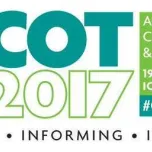At the RCOT annual conference in Birmingham I co-facilitated a workshop with Ben Whittaker called ‘Quality Improvement: Creatively designing sustainable services’ (you can download the slides here). With 23 participants in the room we had an inspiring and fruitful discussion. Comments made by participants suggested they left feeling more optimistic about the occupational therapist’s role as an agent of change in having a positive impact on the quality of their service.
The aims of our session were to explore how the principles of sustainable healthcare support quality improvement interventions, and how occupational therapy aligns with the sustainability strategy in health and social care. We considered that when occupational therapy is ‘Improving Lives, Saving Money’ it also saving carbon and reducing waste, and is therefore meeting the sustainable healthcare ‘triple bottom line’ of economic, social and environmental benefits.
I shared the current work being undertaken by a project group within the World Federation of Occupational Therapists (WFOT) who are in the process of designing a framework of quality indicators by which occupational therapists and stakeholders can design, evaluate and demonstrate impact of occupational therapy services around the world. In the workshop we discussed the Royal College of Physicians quality indicator framework, which includes Sustainability alongside Equity, Accessibility, Appropriateness, Safety, Effectiveness, and being Patient-centred.
Ben highlighted factors involved in sustainable healthcare and reasons for our need to be concerned with the social, environmental and financial impact of our services, and the NHS agenda to reduce its carbon footprint by 80% by 2050. Climate change is the biggest global health threat of the 21st century – it can feel overwhelming to think about ‘but what can I do?’ with such a huge problem. Ben explored the principles of sustainable healthcare in relation to quality improvement.
The workshop shared a practice example from occupational therapists participating in the current Green Ward competition at Southampton General Hospital. This provided a tangible example of the specific and positive impact that frontline occupational therapists can have in wider healthcare systems, based on our thinking about occupation in everyday life. Many participants expressed interest in the Green Ward competition and took information on how to get their Trusts signed up.
As we moved into project groups there was lively discussion and lots of ideas shared. We went from thinking about the sometimes gloomy perspective of service cuts and financial restriction to being agents of change with models of thinking that are inspiring and innovative allowing healthier people, services and planet.
In thinking about equipment, there was a very innovative idea of how equipment can be tracked and returned for recycling or re-use, something that currently seems to be getting worse, not better with single patient use equipment being distributed and poor or no access to recycling depots. Other participants expressed concern that materials can be provided for service users based on their diagnosis rather than their specific needs.
Participants also expressed their concern with bed day targets being finance driven rather than needs led. Assessing needs along with supportive systems could allow improved quality of care which will include better outcomes. There was lots of talk about the need to work collaboratively with our colleagues, the families and the communities where our services and service users are based and function in. Ensuring that services are ‘Appropriate’ to the service user’s needs as such are delivered by the right person, at the right time, right intervention, to the right person, in the right place.
Some of the feedback comments following the workshop were around how it was accessible for persons working at all levels of the system – that as clinicians, managers, commissioners etc we are all responsible and can be agents of change.
We look forward to continuing these conversations, and the growing engagement of occupational therapists and those we work with in thinking about what we do locally while impacting globally for the good of all.

Please log in or sign up to comment.